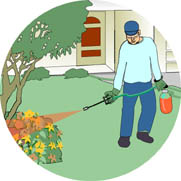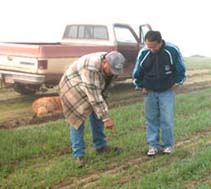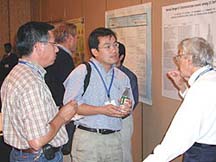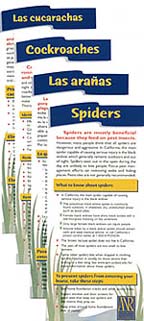|
|
Annual Reports
2003—IPM
in Action (1 of 2)
Education needed for urban pesticide users
|
|
 While
agricultural pesticide use in California is reported to the California Department of Pesticide Regulation,
the record for pesticide use in urban areas is very incomplete. Several recent UC IPM studies have tried to
get a handle on residential pesticide use and attitudes, especially since it has become apparent that urban
contributions to water quality problems are significant. While
agricultural pesticide use in California is reported to the California Department of Pesticide Regulation,
the record for pesticide use in urban areas is very incomplete. Several recent UC IPM studies have tried to
get a handle on residential pesticide use and attitudes, especially since it has become apparent that urban
contributions to water quality problems are significant.
UC IPM Advisor Cheryl Wilen carried out two studies in southern California in 2000-01 and Mary
Louise Flint followed up with a set of comparison surveys in northern California in 2002-03.
About 75 to 80% of California residents in most areas report pesticide use in their landscapes or other outdoor
areas. (This figure is 60% in the SF Bay Area.) Few could name the active ingredient in the products they
used. By far the most common target of treatment was ants. More than half of those surveyed don’t follow
label directions carefully when mixing and more than half dispose of unused pesticide products improperly.
A significant portion still poured leftovers down the drain. Encouragingly, many people were aware of water
quality issues associated with pesticide use, but most didn’t know how they could reduce problems.
Educational recommendations are made in the Wilen and Flint reports on the DPR
Web site. Wilen and Flint along with Minghua Zhang from Land Air Water Resources, UC Davis, are
following up with a just-initiated survey of pesticide use, attitudes, and outreach strategies for commercial
pesticide users in urban areas.
|
Third annual Education Day for retail nursery employees a success
|
Over 120 people attended the third annual UC IPM-coordinated UC Cooperative Extension/California Certified Nursery Professionals
education day for retail nursery employees and others who give advice to consumers about landscape and garden maintenance.
This group is an essential extender of pest management information to millions of California households.
The program included presentations on home and garden pesticide use, selecting quality container plants, and invasive species
sold
in nurseries. Hands-on activities and tours spotlighted native plants in the UC Davis Arboretum, diagnosing insect
and disease problems on ornamentals and home orchards, a tour of the UC Davis Environmental Horticulture Department,
and irrigation issues in the landscape.
Presenters included Steve Dreistadt and Mary Louise Flint (UC IPM Program); Richard
Evans, Loren Oki, and Larry Schwankl (UC Cooperative Extension Specialists); Lynn Wunderlich and Mario
Moratorio (UC
Farm Advisors); Ellen Zagory and Ryan Deering (UC Davis Arboretum); Brian Kempf (Urban Tree Foundation); and Alison
Stanton (California Exotic Pest Plant Council).
|
 Agroecosystems
in the Central Valley are being challenged to reduce pollutants in the environment and ground water. Such concerns
have encouraged producers to explore the potential of conservation tillage and reduced input systems. However, uncertainties
about weed species changes and the implications for weed management are major concerns for growers transitioning
to conservation tillage systems.
Agroecosystems
in the Central Valley are being challenged to reduce pollutants in the environment and ground water. Such concerns
have encouraged producers to explore the potential of conservation tillage and reduced input systems. However, uncertainties
about weed species changes and the implications for weed management are major concerns for growers transitioning
to conservation tillage systems.
UC IPM Advisor Anil Shrestha is collaborating with UC Conservation Tillage Workgroup members Jeff
Mitchell (UC Davis Specialist), Ron Vargas (UC Cooperative Extension Farm Advisor and Director, Madera
County), and Darrell Cordova (Cordova Farms) to study weed population dynamics under conventional and conservation
tillage in a small grain-bean rotation.
First-year results show that weed populations, biomass, and species composition differ between conventional
and conservation tillage systems. Another study looks at weed populations in tomatoes under conservation and conventional
tillage with furrow or sub-surface drip irrigation.
Anil is conducting this work in collaboration with UC Davis Specialists Tom Lanini and Jeff
Mitchell, UC Farm Advisor Gene Miyao (Yolo/Solano counties), UC Davis Associate Professor William
Horwath, and UC Davis graduate student Kipp Sutton. To look at how alteration in cropping systems might
affect weed growth and development, Anil conducted a study with Extension Viticulture Specialist Mathew Fidelibus that demonstrated that the growth of black nightshade could be affected by vine row direction of grapes.
In addition, a study was also conducted with UC Riverside Air Quality Effects Specialist David Grantz to assess crop-weed competition under differing ozone levels. Results of all these studies will be extended to growers
after completion of the experiments.
|
Agricultural Health and Safety Conference held in San Francisco
|
|
 The
UC IPM Program co-sponsored "Challenges in Agricultural Health and Safety," a conference exploring current
research, intervention, and outreach activities related to critical health and safety issues facing the agricultural
workforce.
The
UC IPM Program co-sponsored "Challenges in Agricultural Health and Safety," a conference exploring current
research, intervention, and outreach activities related to critical health and safety issues facing the agricultural
workforce.
Held in San Francisco, September 7 through 9, 2003, the conference brought together researchers,
health care providers, educators, state and federal regulatory agencies, engineers, economists, sociologists, Cooperative
Extension advisors, students, and others.
The more than 120 conference participants met in plenary sessions to explore five thematic areas
of concern: respiratory disease in western agriculture; farm families and life cycle health; minority and farm worker
health; agricultural injuries and ergonomics; and policy and regulatory issues in agriculture. Also, through more
than 25 poster displays, conference participants were able to highlight and discuss their work in detail with others.
The conference was a joint meeting between the Western Center for Agricultural Health and Safety
at UC Davis and the Pacific Northwest Agricultural Safety and Health Center at the University of Washington in Seattle.
These centers are funded by the National Institute for Occupational Safety and Health (NIOSH) and are two of the
nine NIOSH-funded regional agricultural health and safety centers in the United States.
The Pesticide Safety Education Program’s Director, Patrick O’Connor-Marer, chaired the conference
program. O’Connor-Marer serves as the Deputy Director of the Western
Center for Agricultural Health and Safety at UC Davis.
|
Consumer IPM cards reach a wide audience
|
|
 Since
the first print run three years ago, more than 300,000 of UC IPM's consumer pest cards have
found their way into the pockets of pest-weary Californians. Since
the first print run three years ago, more than 300,000 of UC IPM's consumer pest cards have
found their way into the pockets of pest-weary Californians.
These attractive, colorful cards give quick information on how to manage common pests without polluting
waterways and refer users to the more in-depth Pest Notes for additional information. Cards for ants, aphids, cockroaches,
fleas, head lice, lawn insects, rats, snails and slugs, spiders, termites, and tree borers as well as for pesticide
safety and beneficial insects and IPM have been printed. Most are available in both English and Spanish.
The big distributors for the cards have been the county UC Cooperative Extension offices, especially
the Master Gardener programs. Forty-one county offices have distributed the cards at such sites as farmers' markets,
county and state fairs, Earth Day events, professional meetings, workshops, landscape and garden expositions, and
at Master Gardener plant health clinics.
The consumer IPM cards are also available on the UC IPM Web site, along with the Pest
Notes, as Quick
Tips and as downloadable PDFs.
|
Safety training for pesticide handlers
|
|
 An important goal of the Pesticide Safety Education Program (PSEP) is to extend knowledge about pesticide safety to as many pesticide handlers as
possible. An important goal of the Pesticide Safety Education Program (PSEP) is to extend knowledge about pesticide safety to as many pesticide handlers as
possible.
A particularly effective way to reach this goal is to leverage efforts by teaching people how
to train others. Currently, PSEP is collaborating with the California Minor Crops Council in developing train-the-trainer
workshops for mid-sized farming operations in the Central Coast and northern Sacramento Valley that are aimed at
training pesticide applicators and their supervisors to become trainers of their peers.
This project focuses on heightening awareness of pesticide hazards and reducing the risks of community
exposure and water contamination from pesticide applications. Funding was provided by the Governor's Buy California
Initiative, the California Department of Food and Agriculture, and the U.S. Department of Agriculture, through
the University of California's Specialty Crops Research Program.
The project involves two phases: a "Training of Trainers" phase in which PSEP staff
train pesticide handlers and supervisors of pesticide handlers who volunteer to train their peers; and an "Extension
of Training" phase in which these peer trainers extend their training to other pesticide handlers and their
supervisors. After completing this program, participants will be equipped to subsequently conduct ongoing independent
training events within their own communities on how to
- prevent pesticide drift and surface water and groundwater contamination
- reduce risks to workers and communities
- incorporate IPM concepts into their pest management programs.
The first training events are scheduled for Chico (January 15, 2004) and San Luis Obispo (March 2004). For information
about registration, call PSEP (530-752-5273). |
Top of page
|


